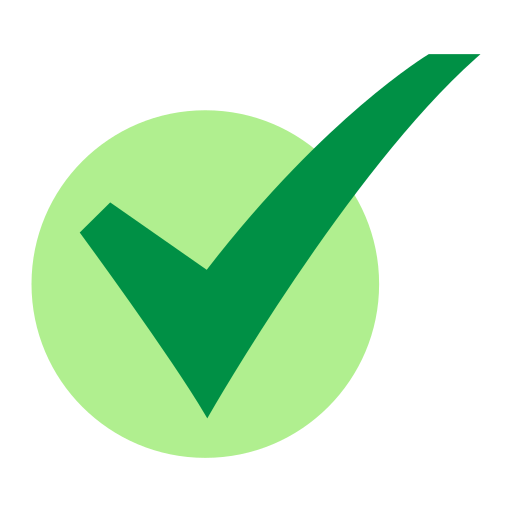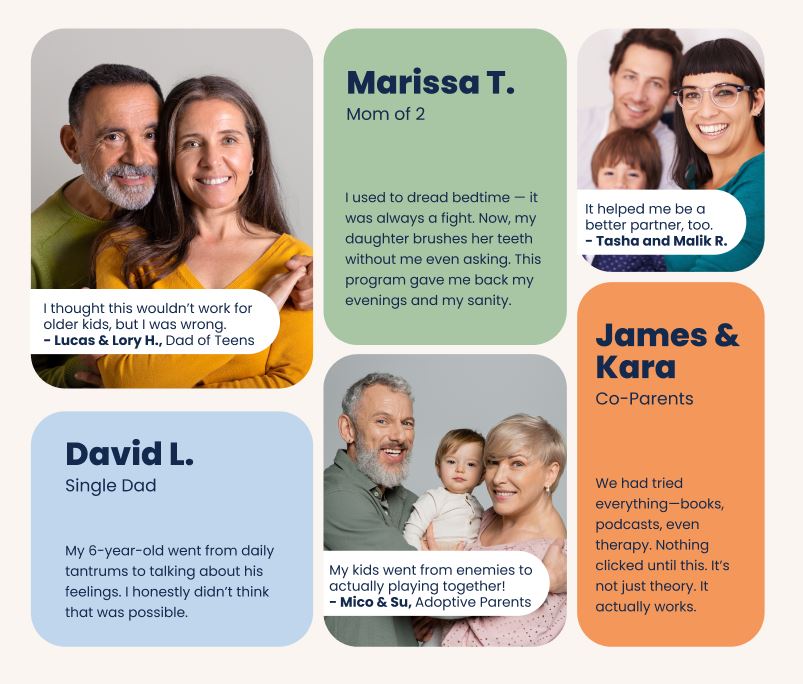Learn immediate tools to calm the chaos and get your child to listen — even when emotions are running high.

Your parenting journey — simplified with tools that actually work.
Raise confident, resilient kids with calm and clarity. Get started right now with our free class.
All About Parenting trainers were featured in:




Yes, parenting can feel peaceful and connected.
If you’re like most parents, you want more calm, more cooperation, and less chaos. But parenting isn’t something you’re taught — until now.
Dealing with Meltdowns in the Moment
Access the Parenting Playbook — a step-by-step guide full of phrases, responses, and activities you can use right away.
Knowing Exactly What to Say
Get on the same page with your kids and co-parent, and finally understand what’s driving your child’s behavior.
Creating a Calm, Balanced Family Dynamic
Learn the techniques that help you reconnect with your child and boost their motivation and confidence.
Rebuilding Connection When You Feel Rejected
Thirty proven tools to help your child take ownership — from chores to homework to life skills.
Raising a Responsible Child (Without Nagging)
Learn immediate tools to calm the chaos and get your child to listen — even when emotions are running high.
Setting Boundaries That Actually Stick
Especially for parents of preteens and teens — guide your child to become a better decision-maker and problem-solver.
Helping Your Child Solve Their Own Problems
Bonus course! Learn what’s actually making the fighting worse — and how to reset the dynamic.
Stopping Sibling Battles for Good

Who Is All About Parenting?

All About Parenting is more than a parenting program: we’re a community of real parents, on the same messy, beautiful journey as you.

We’ve been there: the guilt after yelling, the bedtime battles, the moments you wonder if you’re getting any of this right. And we’ve discovered that it doesn’t have to be this way.

Our science-backed, heart-led system helps you raise confident, emotionally healthy kids…without threats, punishments, or shame. We focus on practical tools that work in real life, not just in theory.

Removing the stress, guilt, and guesswork

Giving you real tools for real-life parenting challenges
A Parenting Journey That
Changes Everything
Explore the Parenting Programs That Have Changed 649,000+ Families
The All About
Parenting Program
10-chapter program with 312
episodes and a lifetime
Parenting Playbook
episodes and a lifetime
Parenting Playbook
The All About
Parenting Program
10-chapter program with 312
episodes and a lifetime
Parenting Playbook
episodes and a lifetime
Parenting Playbook
Simple Steps.
Real Results.
Parenting Support
That Fits Your Life.
No overwhelm. No pressure. Just a clear path to becoming the parent you want to be — with support at every step. Here’s how the All About Parenting journey works
1
Watch
Dive into short, binge-worthy episodes designed for busy parents. Watch on your schedule — even during nap time or school pickup.
2
Apply
Use ready-to-go cheat sheets and your Parenting Playbook to implement what you learn without stress or memorization.
3
Connect
See real shifts in your child’s behavior — and your confidence — as you build calm, connection, and cooperation at home.
From Power Struggles to Peaceful
Solutions — One Tool at a Time
Chapter 1: Emergency Parenting Toolkit
You need answers fast. In Chapter 1 you’ll get a series of incredible techniques that will see you immediately be listened to more and have less arguments at home.
+ You’ll get access to the brilliant Parenting Playbook in online version, packed full of helpful exercises for you and your family.Chapter 2: Start to Build a Balanced Family
Discover the secrets to a balanced family where you get on better with your kids AND your partner or co-parent. Learn the No 1. Best way to understand your children’s behavior.
We guarantee we answer EVERY single question you ever have about parenting in the app. You will never be lost, alone or afraid again.
Chapter 3: How to Have More Love, Empathy and a Confident Child
If you feel rejected and hurt by your child, Chapter 3 will solve this.
It will teach you incredible techniques to rebuild the love between you. You also learn the fundamentals of motivation, so your child grows to be confident in their potential.
Chapter 4: How To Raise a Responsible Child
Tired of complaining about dishes in the sink and homework left undone?
In this chapter learn 30 amazing tools to ensure your child is responsible for their room, life and schoolwork – no matter how old they are.
Chapter 5: How to Setup Rules and Boundaries
A family without rules and boundaries is like a company without a contract. Chaotic.
Discover 25 techniques that will instantly see your child’s behaviour become predictable and consistent.
Chapter 6: Teach Your Child How to Solve Their Own Problems
As children get older they should learn how to manage their own problems.
This chapter is important for parents of pre-teens and teenagers who are reluctant to look after themselves – at home, at school or in their friendships.
Bonus Chapter: STOP ENDLESS KIDS FIGHTING
Without realising it, you’ve been making the arguments worse.
Stop Endless Kids Fighting is a bonus course that will take you from daily screaming matches to children that cooperate.
Chapter 7: How to Stop Yelling and Fix Meltdowns
Learn how to end the cycle of yelling and meltdowns in your family.
First, discover the triggers which are causing you to yell and shout. Then learn practical calming techniques for children of all ages.
Chapter 8: The Bad Behavior Fix Kit
Are they doing the bad behavior deliberately? Are you inadvertently making the behavior worse?
If you’re frustrated by your child’s continual negative attitude and decisions, this Fix Kit gives you a practical guide that will rock your parenting world.
Chapter 9: Discipline with Love
If your child keeps breaking the rules, discover how to apply consequences and discipline with love.
The kind of discipline you wish you’d had as a child yourself and won’t stay up late feeling guilty about.
Chapter 10: Get The Whole Family On Board
It’s time to end the arguments with partners, co-parents and family members.
Discover the secret to influencing human behavior and finally working together like a true team.
Chapter 1: Emergency Parenting Toolkit
You need answers fast. In Chapter 1 you’ll get a series of incredible techniques that will see you immediately be listened to more and have less arguments at home.
+ You’ll get access to the brilliant Parenting Playbook in online version, packed full of helpful exercises for you and your family.Chapter 2: Start to Build a Balanced Family
Discover the secrets to a balanced family where you get on better with your kids AND your partner or co-parent. Learn the No 1. Best way to understand your children’s behavior.
We guarantee we answer EVERY single question you ever have about parenting in the app. You will never be lost, alone or afraid again.
Chapter 3: How to Have More Love, Empathy and a Confident Child
If you feel rejected and hurt by your child, Chapter 3 will solve this.
It will teach you incredible techniques to rebuild the love between you. You also learn the fundamentals of motivation, so your child grows to be confident in their potential.
Chapter 4: How To Raise a Responsible Child
Tired of complaining about dishes in the sink and homework left undone?
In this chapter learn 30 amazing tools to ensure your child is responsible for their room, life and schoolwork – no matter how old they are.
Chapter 5: How to Setup Rules and Boundaries
A family without rules and boundaries is like a company without a contract. Chaotic.
Discover 25 techniques that will instantly see your child’s behaviour become predictable and consistent.
Chapter 6: Teach Your Child How to Solve Their Own Problems
As children get older they should learn how to manage their own problems.
This chapter is important for parents of pre-teens and teenagers who are reluctant to look after themselves – at home, at school or in their friendships.
Bonus Chapter: STOP ENDLESS KIDS FIGHTING
Without realising it, you’ve been making the arguments worse.
Stop Endless Kids Fighting is a bonus course that will take you from daily screaming matches to children that cooperate.
Chapter 7: How to Stop Yelling and Fix Meltdowns
Learn how to end the cycle of yelling and meltdowns in your family.
First, discover the triggers which are causing you to yell and shout. Then learn practical calming techniques for children of all ages.
Chapter 8: The Bad Behavior Fix Kit
Are they doing the bad behavior deliberately? Are you inadvertently making the behavior worse?
If you’re frustrated by your child’s continual negative attitude and decisions, this Fix Kit gives you a practical guide that will rock your parenting world.
Chapter 9: Discipline with Love
If your child keeps breaking the rules, discover how to apply consequences and discipline with love.The kind of discipline you wish you’d had as a child yourself and won’t stay up late feeling guilty about.
Chapter 10: Get The Whole Family On Board
It’s time to end the arguments with partners, co-parents and family members.
Discover the secret to influencing human behavior and finally working together like a true team.
Who Is All About Parenting?
All About Parenting is more than a parenting program: we’re a community of real parents, on the same messy, beautiful journey as you.
We’ve been there: the guilt after yelling, the bedtime battles, the moments you wonder if you’re getting any of this right. And we’ve discovered that it doesn’t have to be this way.
Our science-backed, heart-led system helps you raise confident, emotionally healthy kids…without threats, punishments, or shame. We focus on practical tools that work in real life, not just in theory.
Our team is guided by experienced parenting educators: Patrick Ney and Sabina Defta , who have spent years helping families shift out of survival mode and into more calm, connected parenting.
Learn More About Our Trainers:

Patrick Ney
Patrick Ney, MSc, has been Lead Trainer at All About Parenting since 2019. An inspiring TedX speaker, he has run workshops and seminars for more than 165,000 parents around the world.
Patrick has a Masters of Science in Applied Neuroscience and his Masters Thesis was on Adolescent ADHD and sleep. In addition Patrick is the author of 3 parenting books, 1 of which was an Amazon best-seller.Patrick is a certified DIR Floortimer, a play-therapy methodology for neurodivergent children and his interests span metaphysics, psychology, neuroscience and history.
He lives in Warsaw, Poland with his 2 daughters, Zofia and Mia and his wife, Maja and in his spare time runs ultramarathons. Patrick is also a Qualified First Responder.

Sabina Defta
Sabina Defta is an International Trainer, Coach and Spiritual Guide for Parents all over the World. She is a dedicated mother to three children, two boys, 15 and 11 years old and 8 years old girl. To date, she has run over 500 workshops, events, and masterclasses for more than 100,000 parents, in three languages.
With a diverse, multicultural background and a deep understanding of child development processes, Sabina brings a wealth of insights to her role as an Inspirational and Motivational Parenting trainer.
Her mission is to help parents to heal their inner child along with fostering stronger, healthier relationships with their own children.
Through her experiences such as living in different countries, exploring different cultures, Sabina is dedicated to transforming parenting approaches and guiding parents to balance work with personal lives.
How This Parenting Method Changed Our Lives
Hear firsthand how struggling parents built stronger bonds, better routines, and more peace at home.

Join our masterclass: 3 Steps To Have A Happier Family With Less Arguments And Yelling
In this Masterclass experience, we’ll teach 3 easy-to-implement methods —based on science—to bring more love and less fights into your home. With Neurodevelopmental Specialist, Best Selling Author, and Lead Trainer at All About Parenting, Patrick Ney
Any Questions?
We Got You.
We’ve answered the most common concerns from parents who were once in your shoes — overwhelmed, unsure, and ready for a change.
You only need 10 minutes a day. Episodes are short and practical — perfect for busy parents.
You only need 10 minutes a day. Episodes are short and practical — perfect for busy parents.
You only need 10 minutes a day. Episodes are short and practical — perfect for busy parents.
You only need 10 minutes a day. Episodes are short and practical — perfect for busy parents.
You only need 10 minutes a day. Episodes are short and practical — perfect for busy parents.
US & Canada: +1 240 534 1084/hello@allaboutparenting.com
Europe: +44 7488 881020/hello@allaboutparenting.co.uk

This Is Not a Hack or
Trend. It’s a Lifelong
Parenting Toolkit.
Join hundreds of parents already transforming
their homes with science-backed parenting tools.
All About Parenting™
Empowering parents with practical, science-backed tools.
